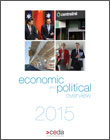Explore our Climate and Energy Hub
03/03/2015
"We’re going to have a fight with the Commonwealth…by asking for an increased share of the GST,” he said.
Dr Nahan said the Government will build on existing strengths in mining to drive the economy.
“We’re going to continue to focus on the mining sector as our driver of growth and we’re going to continue to focus on population growth including the vibrancy of the state,” he said.
Dr Nahan said the economy has become more diverse since the mining boom which is positive for future economic growth.
“We’ve had such a diversification of our service base of the resource sector,” he said.
“We’ve had a deepening and widening of the resource base in terms of productive capacity, in terms of head office facilities and contractors and in terms of R&D…and that puts us in good stead.”
Perth should also be a vibrant city, attracting and retaining migrants and developing infrastructure, Dr Nahan said.
Woodside CEO and Managing Director, Peter Coleman also spoke at the event, discussing the resource sector and the end of the supercycle.
“WA is used to boom and bust cycles,” he said.
In order to survive downturns and inevitable cycles, businesses must be prepared Mr Coleman said.
“For businesses to be prosperous and excel they need to become predictive in the outcomes that they have, they need to be able to be predictive in times of uncertainty,” he said.
Mr Coleman said Woodside is going through a cultural transformation which includes focussing on performance excellence, IT and financial discipline.
“Only by embedding the right behaviours can companies really be well placed to go through the inevitable peaks and troughs that our industry has,” he said.
On the outlook for the future, Mr Coleman said businesses with a good global plan will remain competitive and take advantage of low oil prices.
“Those businesses that have a strong balance sheet today and have a strong plan in place are well placed to take advantage of this situation,” he said.
“It’s about making the right choices, being patient, pragmatic and having financial discipline.”
“We are in a globally competitive environment, we must develop our business models so that we can be successful no matter what happens throughout the commodity cycles.”
Speaking on the world economy, Standard and Poor’s Rating Services Head of Developed Markets, Asia Pacific (ex-Japan) and Australia and New Zealand Country Head, Fabienne Michaux said global growth will continue in 2015.
“Overall we are seeing global growth growing in 2015 predominantly off the back of more momentum in the US,” she said.
Ms Michaux said China’s growth is slowing and that has an impact on Australia which relies on foreign investment capital.
“We need to remain an attractive destination for that capital so (we need) a strong banking system, sound governance,” she said.
On the topic of climate change, Ms Michaux said we will need to watch China closely.
“China currently has seven ETS pilots running in different regions…with a view to learning from those pilots so they can produce a national scheme,” she said.
Due to Australia’s reliance on resources and fossil fuels, this will impact the economy, she said.
“Increasingly we need to find a path that helps us lead to a future that has a lower carbon future and footprint and creates the right investment opportunities to help us get there,” she said.
Discussing national politics, The Australian Contributing Editor, Professor Peter Van Onselen said there isn’t much policy discussion at the moment.
“There’s not a lot of policy in the politics sphere at the moment and there’s not a lot of political capital,” he said.
Professor Van Onselen said leadership is currently dominating the conversation.
“On the leadership I would be gobsmacked if Tony Abbott finds a way to survive until the next election,” he said.
“In the last poll as well as what I am told, the internal polling reflects that the Liberal Party’s brand isn’t damaged yet but the Prime Minister’s brand certainly is.”
It is likely that Malcolm Turnbull will be the next prime minister and a question of not if but when, he said.
“If there is a leadership change to happen post budget, we are more likely to see ourselves in a scenario where there is a requirement for a mini budget in the second half of the year,” he said.
Professor Van Onselen said welfare is likely to remain a policy priority regardless of who is prime minister.
“It will be a space that you would think they will continue on because it has such an impact on the Budget bottom line,” he said.
 CEDA's Economic and Political Overview
CEDA's Economic and Political Overview
CEDA's Economic and Political Overview (EPO) is Australia's premier publication and series of briefings on the Australian economy and politics for the year ahead. Running for more than 30 years, the EPO brings together political, economic and business leaders and provides CEDA members with business intelligence on the environment they will be operating in over the next 12 months.
CEDA's 2015 EPO will provide economic and political forecasts and also examine funding options from the finance sector and some proposed market-based reforms and equity issues in Australia.
Download 2015 EPO publication (pdf)
Find our more about CEDA's EPO or read articles and watch videos from EPO events.
